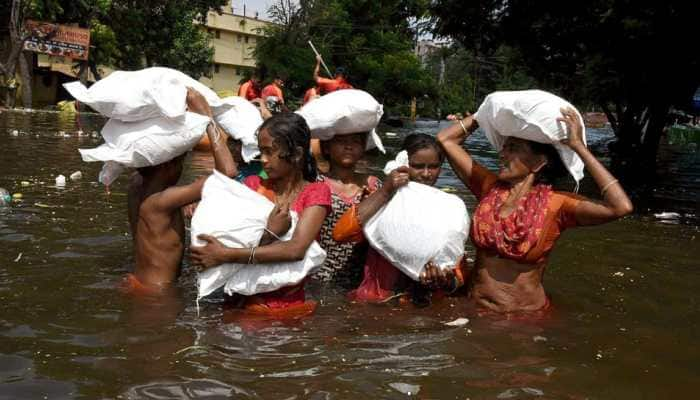Thousands march as UN climate talks head to crunch phase
Pope Francis on Sunday urged nations to act with "courage" while 10,000 climate activists took to the beach in Belgium, a day before UN talks enter their crunch phase in the search for a historic pact against global warming.
Trending Photos
)
Brussels: Pope Francis on Sunday urged nations to act with "courage" while 10,000 climate activists took to the beach in Belgium, a day before UN talks enter their crunch phase in the search for a historic pact against global warming.
The envisaged deal seeks to revolutionise the world`s energy industry by replacing coal, oil and gas with renewable sources that do not emit heat-trapping greenhouse gases.
The talks in Le Bourget, just north of the French capital, crown more than two decades of fraught negotiations to curb climate change, which threatens to make Earth increasingly hostile to human existence.
Speaking before thousands of worshippers in the Vatican, Francis said he prayed that leaders would muster "the courage to keep as their guiding criterion the well-being of the entire human family".
And near Ostend in Belgium, more than 10,000 climate activists pushing for an "ambitious, fair and binding" deal marched along the beaches.
In Paris, a coalition of African nations and donors on Sunday unveiled an ambitious initiative to restore 100 million hectares (25 million acres) of degraded and felled forests, to absorb CO2 and provide a livelihood for the poor.
The talks opened November 30 with a record-breaking gathering of 150 world leaders who issued a chorus of warnings about mankind`s fate if global warming goes unchecked.
"The future is one that we have the power to change right here, right now, but only if we rise to this moment," US President Barack Obama told the summit.
Negotiators spent the rest of last week trying to address the many deep and complex divisions among countries with competing national interests -- rows that have condemned previous UN efforts to failure.While none of the major arguments have been resolved, negotiators did meet Saturday`s deadline to produce a draft for the agreement, showing enough compromise to offer hopes for cautious optimism.
Environment and foreign ministers will take the blueprint up on Monday, seeking to eliminate hundreds of bracketed words or sentences that indicate disagreement.
Small island nations most vulnerable to rising sea levels and stronger storms, often railroaded by the powerful in the UN talks, said they were relieved their voices were being heard in Paris.
"We would have wished to be further along than we are at this point, but the text being forwarded so far reflects our key priorities," said Thoriq Ibrahim from the Maldives.
China, after being accused of contributing to the spectacular failure of the last attempt at a global climate pact in Copenhagen six years ago, offered encouraging words.
"We are very happy to have this progress. The political will is there from all parties," Chinese climate envoy Su Wei told reporters.
Still, all those directly involved, as well as environment groups who follow the negotiations closely, emphasised that success was not even close to being guaranteed.
"Let`s be frank: all the difficult political issues remain unresolved," European Climate and Energy Commissioner Miguel Arias Canete said on Saturday. France has set a December 11 deadline for settling 20-year old rows that primarily pit rich nations against developing ones.
South African negotiator Nozipho Mxakato-Diseko drew on her nation`s revered democracy hero in a bid to inspire.
"In the words of Nelson Mandela, it always seems impossible until it is done," said Mxakato-Diseko, who is also the head of a powerful 134-nation bloc of developing nations known as the "G77 plus China".
Scientists warn Earth will become increasingly dangerous for mankind as it warms, with rising seas consuming islands and populated coastal areas, as well as more catastrophic storms and severe droughts.
The planned deal would seek to cap warming at 2.0 degrees Celsius (3.6 degrees Fahrenheit) below pre-Industrial Revolution levels.
Many nations, especially smaller, poorer ones, want a target of 1.5 degrees C.
Among the biggest disputes is a demand by developing nations for hundreds of billions of dollars to pay for the costly shift to renewable energy technologies, and cope with the impact of climate change.
Rich nations committed six years ago to begin channelling $100 billion (92 billion euros) a year annually to developing nations from 2020, when the Paris agreement would enter into force.
But the United States and other rich nations failed to lay out how this would happen, or whether the amount would increase over time.
There is also still a big divide over when architecture should be put in place for five-yearly reviews that could pressure nations to increase the ambition of carbon-cutting pledges.
Stay informed on all the latest news, real-time breaking news updates, and follow all the important headlines in india news and world News on Zee News.
Advertisement
Live Tv
Advertisement







)
)
)
)
)
)
)
)
)
)
